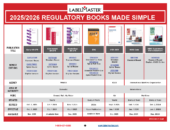
The FAA and PHMSA discuss future rule making and U.S. harmonization with international requirements
The US Department of Transportation’s (USDOT) Pipeline and Hazardous Materials Safety Administration (PHMSA) and Federal Aviation Administration (FAA) held a joint public meeting in Washington, DC on September 18th. The principal topic of discussion was the situation regarding the transport of lithium batteries via aircraft. This past summer, many individual airlines took action to limit the transport of such batteries aboard their aircraft in excess of the prohibitions that already existed in both the US 49 CFR Hazardous Materials Regulations (HMR) and the International Civil Aviation Organization’s (ICAO) Technical Instructions for the Safe Transport of Dangerous Goods by Air (ICAO TI). Battery shippers are naturally concerned that this important avenue of transport may be further restricted, and the meeting was designed to update such concerned parties as to the most current developments in policy.
Current Aircraft Systems and Risk Mitigation
A discussion was held about current Li Battery regulations and outlining future actions that have already been largely agreed to on international levels. FAA then covered their most recent interactions with various ICAO committees responsible for activity under both Annex 18 and Annex 6. Topics reported on included:
- Current aircraft systems and their ability to handle potential incidents involving Li batteries.
- Transport risk and risk mitigation issues including addressing mitigation over multiple fronts.
FAA Test Results Controversy
FAA then outlined some of their test results involving lithium cells and batteries. This has been a subject of some controversy, account FAA’s alleged use of subject batteries in the testing which were unproven to meet the current UN 38.3 performance criteria. Among the various responses to the test results that FAA discussed as potential future areas of action were:
- The use of safety risk assessments by carrier/operators
- Potentially requiring a reduced charge state for shipped batteries
- A comprehensive ban on transport by air
- The removal of existing exceptions for small batteries
- Developing more specific packaging performance standards.
Participants commented on all the above issues, as well as on what form future rulemakings might take and the extent to which the US should or should not harmonize its requirements with the international community. A Public Docket is available to which comments may be added. This docket will remain open until September 28th. The docket number is DOT-OST-2015-0169. Another meeting planned for early next month will explore feedback received to that point.
Labelmaster is a full service provider of goods and services for the Hazardous Materials and Dangerous Goods professional, shippers, transport operators, and EH&S providers. See our full line of solutions at www.labelmaster.com.


